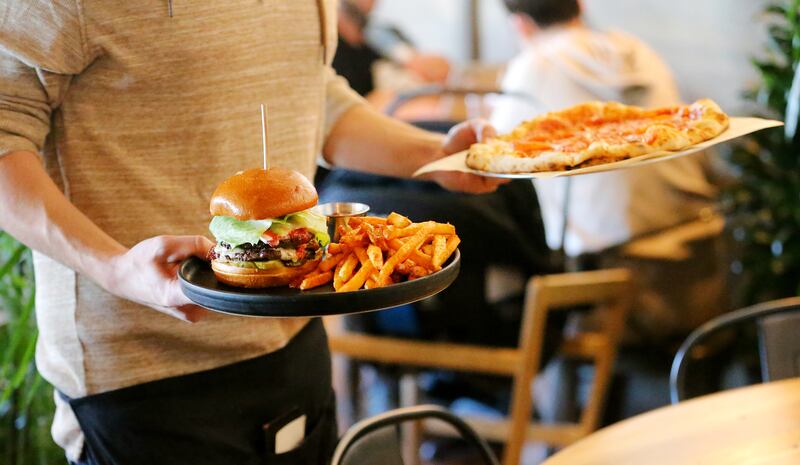It can be awkward. The restaurant server who waited on your table swipes your credit card at your table. After the tablet displays the total for your party’s food and beverages, a window pops up with options for a tip such as 10%, 15%, 20% or perhaps more.
As the server waits, you decide how much to add to the tab for their service.
Thoughts race through your mind about your dining experience: “The server was friendly but our drink orders were wrong. My husband’s steak was overcooked and I had to ask twice for water. Everything else was fine. I want to tip, of course, but was the service worth 20%?”
As the server waits, you have to make a decision and any delay on your part makes things more awkward.
“That social pressure is just a killer,” said Andrea Archuleta of Clearfield, who was one of 800 Utahns who responded to a recent Deseret News/Hinckley Institute of Politics poll conducted by Dan Jones & Associates.

Nearly one-third of the people who responded to the poll — 31% — said they felt pressured about tipping in the past year although 20% said they felt happy about it.
Archuleta said it can be difficult to hit the sweet spot when providing a gratuity.
“I don’t want to have them to feel unappreciated or like I’m not giving enough. So I always feel like whatever I’m doing isn’t the right answer. I’m doing too much. I’m doing too little. It’s that feeling they’re going to talk about it the minute you leave the room,” she said.
The poll, conducted April 25-28, asked about an array of services and whether it was appropriate for service providers to ask for tips. The strongest support was for wait staff at sit-down restaurants, with 84% of those responding indicating they should ask for tips.
Seventy-seven percent indicated support for tipping for food delivery services but there was far less support for tipping in fast-casual restaurants or when picking up takeout food.
Utahns’ support of coffee shops asking for tips was a dead heat: 49% said they should and 49% said they should not.

Melva Sine, president and CEO of the Utah Restaurant Association, said whether to tip and how much to tip is wholly up to the consumer.
Sine said she was part of a group that recently traveled to Washington, D.C. They arrived in the early morning and decided to eat breakfast before starting their day.
As they sat down, their server accidentally spilled drinks on people in their party, she said.
“She was a young lady, right? You could tell she was new. We tried to calm her down and whatnot. She was so upset at herself. None of us had on great clothes. We weren’t dressed up or anything because we just got off a plane. We calmed her down and we still left her a tip. Anybody can make a mistake,” Sine said.
Sine said it is a personal choice whether to tip but she hopes when people dine out that they appreciate that the restaurant industry and its workforce are experiencing multiple challenges.
Many seasoned professionals were sidelined during the pandemic when the state ordered sit-down restaurants closed in March 2020.
“In a matter of 45 days, we went from 111,000 employees to 63,000, almost cut in half, right? So now, during the recovery period, we’ve been building that employment rate back up and whatnot, but that means a lot of training,” she said.
Inflation and supply chain issues have driven up costs for restaurateurs, which has affected menu prices. But numbers of employees now exceeds pre-pandemic numbers, roughly 117,000 due to Utah’s strong economy and the opening of new restaurants, Sine said.
Employers in sectors where tipping has not been the norm run the risk of placing customers in an uncomfortable position, experts say.
One Pennsylvania woman quoted in an Associated Press report said her mortgage company had asked her for tips. Social media is rife with other examples, such as a seamstress who asked a mother of the bride for a tip above the posted alteration fee for a wedding dress.
According to the Deseret News/Hinckley Institute of Politics poll, 55% of Utahns said tipping has become more of an expectation for services and purchases.
Thirty-four percent said it is somewhat more of an expectation, while just 9% said it was somewhat less or much less of an expectation.

According to the poll results, more than half of Utahns said movers should not ask for tips. Fifty-six percent said hotel services should not ask, either.
Utahns were most opposed to child care providers asking for tips, with 73% saying they should not.
Meanwhile, 59% of the sampling of Utahns polled said taxi or rideshare drivers should ask for tips, although experts say there are differences between the two providers that should be taken into account.
Taxi drivers are employees of a taxi company, which provides and insures cars, while Uber drivers are independent contractors driving their own cars. This means Uber drivers get paid differently and assume more personal and professional risk, tipping expert Valerie Sokolosky told Readers Digest.
Emily Post’s Etiquette website advises tipping taxi drivers 15%-20% of the fare and extra for handling bags.
The same range is recommended at hair salons.
For takeout food, there is no obligation to tip, but it suggests a 10% gratuity for curb delivery or large, complicated orders.
Sine said there’s no reason to feel pressured because tipping is the consumer’s call.
“That’s the nice thing about tipping, it’s entirely your choice, the amount you give, and those kinds of things you tip for is up to the individual and their comfort zones,” she said.


